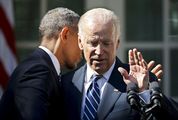African musicians tune into continents market
by Yinka Ibukun and Dulue Mbachu,
2015-10-21 05:34:04.0
THE mansion, the pool, the Bentley, the life-size portrait and the gold medallions are the spoils of a revolution in Nigeria and music superstar D’banj is enjoying them.
The 35-year-old used to have to bargain with street-market traders to sell his CDs because there were no formal distribution outlets.
Today, MTN Group, Africa’s biggest cellphone operator, andEmirates Telecommunications Corporation sell songs by D’banj and other stars such as Davido and 2Face as ringtones and downloads. And now the Tidal music streaming service owned by US rapper Jay-Z is interested in the Nigerian market.
"Our consumers can’t get enough of it; you only need to give them a way to get the music," D’banj, whose real name isOladapo Daniel Oyebanjo, said at his home in an up-market neighbourhood of Lagos.
"The telecommunications companies are bridging the gap and they’re raking in billions and billions of naira every year, just from content."
Thanks to Nigeria’s answer to Spotify and Apple Music, the music industry has seen sales triple in the past five years as cellphone downloads surged, despite rampant piracy.
With at least 550 albums each year, revenue to artists from sales is now worth more than $150m annually, according to Sam Onyemelukwe, CEO of Lagos-based Entertainment Management Company, partner of Paris-based Trace TV.
Outside of his revenue from Apple’s iTunes, D’banj said in the past 18 months he’d earned more than $200,000 from sales in Nigeria. "It’s close to buying me a Ferrari," he said.
More than two-thirds of MTN’s 63-million subscribers in Nigeria were using its ringtones service, for as little as 50 naira ($0.25) a song, with downloads on its Music Plus platform growing by 25% a year,said Richard Iweanoge, MTN Nigeria’s general manager for consumer marketing.
"We have become the largest distributor of music in Nigeria,"Mr Iweanoge said. "It turned out that Nigerians actually wanted to buy music, they just didn’t have a legal way to acquire it."
The boom has drawn the attention of Jay-Z, the rapper whose real name is Shawn Carter. "My cousin just moved to Nigeria to discover new talent,"he said on April 26 on his Twitter account. It was part of his move to make his Tidal music-streaming business "a global company", Mr Iweanoge said.
Boosted by satellite television outlets such as Trace TV and MTV Base Africa, many Nigerian musicians have won international acclaim.
"Trace and MTV Base have played a very good part in bringing the artists to the rest of the world," Mr Onyemelukwe said. "We pay royalties and it brings the viewers to whom we can advertise to gain revenue."
At the 2015 MTV Base Africa Awards held in SA in July, Nigerian musicians swept the most prestigious awards, with Davido winning best male artist and Yemi Alade best female artist.
D’banj, ambassador for brands from Apple’s Beats Music to Diageo’s Ciroc Vodka, clinched an award for popularising African music.
"We’re operating in a music industry that doesn’t have clearcut structure," D’banj said. "It’s a global thing. Everyone is trying to come up with new formulas."
In the 1960s and ’70sNigeria had a robust music industry, with EMI Group, Philips Records and Polydor publishing the works of musicians including the late Fela Anikulapo-Kuti, King Sunny Ade and Osita Osadebe who went on to achieve global appeal.
Most of the companies pulled out in the 1980s as an economic crisis led to currency devaluations and lower disposable income. "When the big recording companies left Nigeria and the local ones took over, things went south," said Tola Ogunsola, co-founder of Nigerian music-download website MyMusic.
"There was no formal distribution any more."
That left musicians resorting toselling their rights to distributors for a one-time fee, or heading over to the open-air Alaba market in Lagos to get traders to distribute their recordings.
Then, in 2001, MTN led the introduction of cellphones in Nigeria, and today there are almost 149-million lines. That has given local artists an unparalleled avenue to distribute their songs.
Bloomberg
BUYING POWER: Musician D'banj says African music is gaining legs in the market. Picture: BLOOMBERG/PAUL ODIJIE
THE mansion, the pool, the Bentley, the life-size portrait and the gold medallions are the spoils of a revolution in Nigeria and music superstar D’banj is enjoying them.
The 35-year-old used to have to bargain with street-market traders to sell his CDs because there were no formal distribution outlets.
Today, MTN Group, Africa’s biggest cellphone operator, andEmirates Telecommunications Corporation sell songs by D’banj and other stars such as Davido and 2Face as ringtones and downloads. And now the Tidal music streaming service owned by US rapper Jay-Z is interested in the Nigerian market.
"Our consumers can’t get enough of it; you only need to give them a way to get the music," D’banj, whose real name isOladapo Daniel Oyebanjo, said at his home in an up-market neighbourhood of Lagos.
"The telecommunications companies are bridging the gap and they’re raking in billions and billions of naira every year, just from content."
Thanks to Nigeria’s answer to Spotify and Apple Music, the music industry has seen sales triple in the past five years as cellphone downloads surged, despite rampant piracy.
With at least 550 albums each year, revenue to artists from sales is now worth more than $150m annually, according to Sam Onyemelukwe, CEO of Lagos-based Entertainment Management Company, partner of Paris-based Trace TV.
Outside of his revenue from Apple’s iTunes, D’banj said in the past 18 months he’d earned more than $200,000 from sales in Nigeria. "It’s close to buying me a Ferrari," he said.
More than two-thirds of MTN’s 63-million subscribers in Nigeria were using its ringtones service, for as little as 50 naira ($0.25) a song, with downloads on its Music Plus platform growing by 25% a year,said Richard Iweanoge, MTN Nigeria’s general manager for consumer marketing.
"We have become the largest distributor of music in Nigeria,"Mr Iweanoge said. "It turned out that Nigerians actually wanted to buy music, they just didn’t have a legal way to acquire it."
The boom has drawn the attention of Jay-Z, the rapper whose real name is Shawn Carter. "My cousin just moved to Nigeria to discover new talent,"he said on April 26 on his Twitter account. It was part of his move to make his Tidal music-streaming business "a global company", Mr Iweanoge said.
Boosted by satellite television outlets such as Trace TV and MTV Base Africa, many Nigerian musicians have won international acclaim.
"Trace and MTV Base have played a very good part in bringing the artists to the rest of the world," Mr Onyemelukwe said. "We pay royalties and it brings the viewers to whom we can advertise to gain revenue."
At the 2015 MTV Base Africa Awards held in SA in July, Nigerian musicians swept the most prestigious awards, with Davido winning best male artist and Yemi Alade best female artist.
D’banj, ambassador for brands from Apple’s Beats Music to Diageo’s Ciroc Vodka, clinched an award for popularising African music.
"We’re operating in a music industry that doesn’t have clearcut structure," D’banj said. "It’s a global thing. Everyone is trying to come up with new formulas."
In the 1960s and ’70sNigeria had a robust music industry, with EMI Group, Philips Records and Polydor publishing the works of musicians including the late Fela Anikulapo-Kuti, King Sunny Ade and Osita Osadebe who went on to achieve global appeal.
Most of the companies pulled out in the 1980s as an economic crisis led to currency devaluations and lower disposable income. "When the big recording companies left Nigeria and the local ones took over, things went south," said Tola Ogunsola, co-founder of Nigerian music-download website MyMusic.
"There was no formal distribution any more."
That left musicians resorting toselling their rights to distributors for a one-time fee, or heading over to the open-air Alaba market in Lagos to get traders to distribute their recordings.
Then, in 2001, MTN led the introduction of cellphones in Nigeria, and today there are almost 149-million lines. That has given local artists an unparalleled avenue to distribute their songs.
Bloomberg




















Change: 0.73%
Change: 0.66%
Change: 0.57%
Change: 0.56%
Change: 1.44%
Data supplied by Profile Data
Change: 0.54%
Change: 1.18%
Change: 0.73%
Change: 0.00%
Change: 1.14%
Data supplied by Profile Data
Change: -0.59%
Change: -0.61%
Change: -2.00%
Change: -0.89%
Change: -0.48%
Data supplied by Profile Data
Change: 0.17%
Change: 0.36%
Change: 1.02%
Change: 0.59%
Change: 1.34%
Data supplied by Profile Data